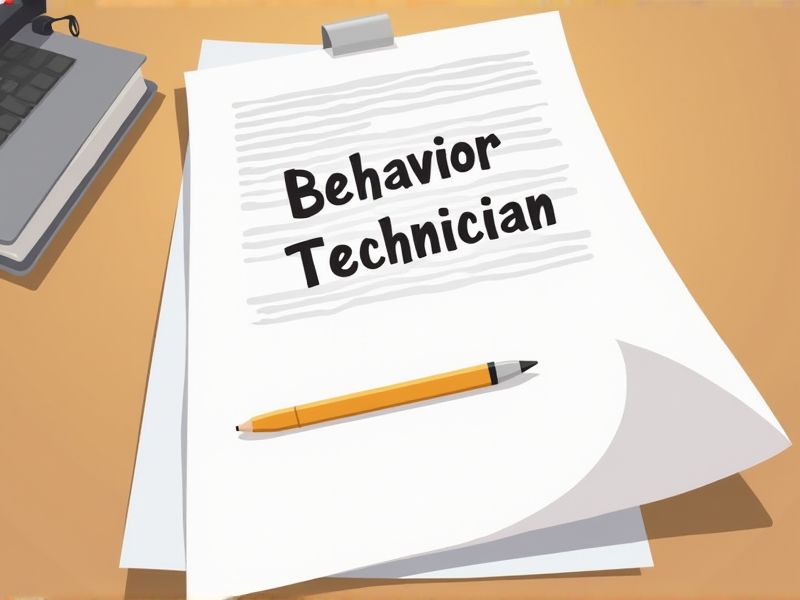
Behavior Technicians play a crucial role in implementing behavior modification plans and require specific skills to do so effectively. Certain certifications ensure these professionals are equipped with the necessary knowledge and competencies to handle diverse behavioral challenges. These certifications also standardize practices across the field, ensuring a consistent approach to behavior analysis and intervention. Here are some key certifications that may be necessary for a Behavior Technician.
Registered Behavior Technician (RBT) Certification
RBT certification ensures a standardized level of competency and knowledge in behavior analysis practices, which directly leads to improved treatment effectiveness. Organizations that employ RBT-certified individuals experience enhanced consistency and quality in their therapeutic services, due to adherence to established protocols. The certification process fosters professional development, increasing job satisfaction and career progression opportunities for behavior technicians. Parents and clients gain trust and confidence when behavior technicians possess certification, which signifies a dedicated commitment to ethical and effective practice.
CPR Certification
Behavior technicians often work with individuals who may have medical emergencies, such as choking or cardiac arrest. Acquiring CPR certification equips them with the necessary skills to respond promptly and effectively in such situations. Many workplaces require CPR certification as part of compliance with safety regulations to ensure a secure environment for both employees and clients. Having CPR training can enhance a behavior technician's confidence and ability to provide comprehensive care when emergencies occur.
First Aid Certification
Having a First Aid Certification equips behavior technicians with essential emergency response skills, which increase workplace safety. When unforeseen incidents occur, technicians can provide immediate care, stabilizing the situation until professional medical services arrive. Clients with behavioral challenges often face increased risk of accidental injuries, making prompt intervention crucial. Employers often require this certification as it minimizes liabilities and enhances overall client trust and care quality.
Crisis Prevention Intervention (CPI) Certification
Behavior Technicians often work with individuals who may exhibit challenging behaviors. Without proper training, these situations can escalate, increasing the risk of harm to both the technician and the individual. CPI Certification equips technicians with skills to safely de-escalate situations, promoting a safer environment. The certification also aligns with best practices and regulatory requirements, enhancing the quality of care provided.
Applied Behavior Analysis (ABA) Certification
Obtaining an ABA Certification ensures that a Behavior Technician has the necessary knowledge and skills to apply evidence-based practices effectively. This certification standardizes the level of competency, improving the quality of care provided to individuals with behavioral challenges. Regulatory bodies and employers often require certification to maintain industry standards and credibility. A certified technician is more likely to achieve better client outcomes, as they adhere to proven methodologies and ethical guidelines.
Mental Health First Aid Certification
Behavior Technicians often work with individuals displaying challenging behaviors or mental health issues, requiring the capability to recognize early signs of mental distress. Mental Health First Aid Certification equips them with the necessary skills to temporarily mitigate crises, promoting better outcomes for individuals in distress. Having this certification improves the quality of care by empowering technicians to offer immediate and appropriate support. It broadens their skillset, fostering a safer, more responsive working environment and enhancing the overall efficacy of behavioral interventions.
Nonviolent Crisis Intervention Certification
Behavior technicians often work with individuals who may exhibit challenging behaviors, necessitating skills in de-escalation to maintain safety. Nonviolent Crisis Intervention Certification provides them with effective strategies to handle potentially volatile situations without resorting to force. This training emphasizes understanding the causes of behavior, allowing technicians to respond proactively and compassionately. Receiving certification enhances their ability to create a supportive environment, reducing the risk of injury or escalation.
Bloodborne Pathogens Training Certification
Behavior Technicians often work with individuals who may have injuries or medical conditions, increasing their risk of exposure to bloodborne pathogens. Proper training ensures they understand how to identify and mitigate these risks, reducing the chance of disease transmission. Having this certification also aligns with occupational safety standards, promoting a safer work environment. Regulatory requirements often mandate such training for compliance with health and safety laws.
Autism Spectrum Disorder (ASD) Training Certification
Obtaining an Autism Spectrum Disorder (ASD) Training Certification equips Behavior Technicians with specialized knowledge crucial for understanding the unique needs and challenges faced by individuals with autism. This certification enhances the ability to apply tailored behavioral interventions, resulting in more effective treatment plans. A certified technician is more likely to gain the trust of families and healthcare providers, which improves collaboration and treatment outcomes. The certification often leads to better job opportunities and career advancement in the field of behavioral therapy.
Data Collection and Analysis in Behavioral Interventions Certification
Behavior technicians play a pivotal role in implementing and assessing behavioral interventions, making data collection and analysis certification essential for accuracy and efficacy. Inconsistent or incorrect data can lead to ineffective intervention strategies, hampering progress. Certification equips technicians with standardized methods and tools that ensure reliable data interpretation. Evidence-based adjustments to interventions hinge on sound data, directly benefiting client outcomes.
Summary
By obtaining certifications, you can enhance your credibility as a Behavior Technician. This often leads to increased job opportunities and potential for higher pay. Employers may place more trust in your skills, allowing for greater responsibilities in your role. Certification can also keep you updated with the latest practices and techniques in behavioral therapy.
